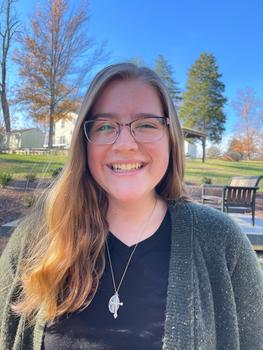2022 HAP graduate Nadia Anderson aids in the search for what makes comprehensive care possible

When asked to describe what they associate the words "health care" with, most people would identify nurses or doctors. Not everyone would picture the individuals behind the scenes who make care delivery possible, health administrators. Nadia Anderson, a 2022 Health Administration with a concentration in Health Systems Management graduate, intends to become a health care administrator and improve patients’ experiences. Despite her initial plans to become a nurse or doctor a life-changing discovery altered her original path into the health care field.
“Ever since I was little, I knew that I wanted to go into the medical field, either as a nurse or a doctor. It wasn’t until I was diagnosed with cancer as a teenager that I reevaluated that desire. After going through treatment for many years, I did not really feel comfortable with the clinical side of things,” said Anderson. “It was soon after that I learned about health administration, which was more behind the scenes, and focused more on the organizing, planning, and managing skills that I excel in. This career option allowed me to still be in the medical field, but contribute in a different way.”
The Future of Comprehensive Care
She aims to become a health care administrator, who ensures smooth delivery of health services in hospitals, nursing homes, and anywhere that serves the medical needs of communities. Doctors, nurses, and health care administrators all coordinate to meet the diverse needs of patients within these care settings.
As with anyone working in a health care position, Anderson wants to provide the best care for her patients and recognizes that might include undiscovered technology.
Anderson is currently working as an intern on a project with the bioengineering students at the Inova Health and Vascular Institute for a partnered initiative between the College’s Department of Health Administration and Policy and the Volgenau School of Engineering’s Department of Biomedical Engineering to conduct research studying the ways technology can be more effectively used in health care delivery.
"[Bioengineering and health care administration] are two very different things. The one common goal is to contribute to the medical field, working with other disciplines to ensure efficient and effective patient care,” Anderson said about why she took an interest in bioengineering.
Bioengineering, also known as biomedical engineering, is the study of how engineering tools and technology can increase efficacy in health care. This field uses research-based approaches and computation to solve problems in biology and medicine.
As an intern, Anderson has had the opportunity to witness how these two different disciplines work together. “I really enjoyed working in an interdisciplinary group, learning how the bioengineering side and the health administration side of the field interact,” said Anderson. “My role as a liaison between the bioengineering project teams and medical professionals was something that I found helpful and a great introduction to communication within the medical field.”
When questioned about what she is optimistic for in the future of health care, Anderson said, “I am hopeful for health systems being able to provide seamless, comprehensive care for patients.”
